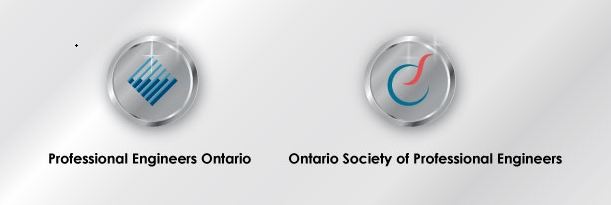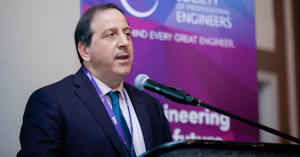 Last week, Professional Engineers Ontario (PEO) held its 2017 Council Election All Candidate Meetings. During the President-elect panel, candidates were asked questions that pertain to OSPE’s role as the advocacy body for the engineering profession in Ontario (as you may know, OSPE and PEO have two distinct mandates, which are often confused).
Last week, Professional Engineers Ontario (PEO) held its 2017 Council Election All Candidate Meetings. During the President-elect panel, candidates were asked questions that pertain to OSPE’s role as the advocacy body for the engineering profession in Ontario (as you may know, OSPE and PEO have two distinct mandates, which are often confused).
David Brown, P.Eng., Darla Campbell, P.Eng., and Peter DeVita, P.Eng., three of the four candidates running for President-elect (Faizul Mohee, P.Eng. was not in attendance), spoke regarding their platforms and answered questions from other PEO members. We’ll take this opportunity to answer questions regarding OSPE here.
Please note, the quotes included below are excerpts and do not represent the entirety of each candidate’s comments. If you would like to view the full meeting, watch the webcast here.
-
What is your opinion on the disparity between compensation of engineers versus other professionals such as lawyers, accountants and doctors? Are there things that council can do to help raise the level of compensation for engineers to the level of other professionals?
Peter DeVita, P.Eng.: “That is more of an OSPE question. It certainly has been a concern. I’ve sat on both the OSPE side and the PEO side, and I’ve tracked incomes going back 100 years, so I know that at one point in the 1920s for example, engineers made more money than lawyers and doctors… We don’t have a truly restricted practice in engineering, and that impacts just about everything that happens in the profession.”
Darla Campbell, P.Eng.: “It’s a task that should be delegated to OSPE rather than PEO… It’s important, but I don’t see it falling clearly within the mandate of PEO Council.”
David Brown, P.Eng.: “As a regulator, I’m not sure that we’re in the right avenue and it does fall within OSPE. However, this is to me a supply and demand situation. There is an oversupply of engineers, and consequently, when you have an oversupply, the price goes down. On the demand side, we have very little demand-side legislation requiring engineers, specifically licensed engineers to do things… But I don’t think it falls under PEO to solve that problem.”
OSPE’s answer:
Ontario’s labour market and the so-called skills gap have been the subject of much discussion in engineering circles – complicated by the existence of three conflicting trends:
- This spring, Ontario’s universities will graduate a record number of engineering degree holders, surpassing the record set the year prior and the one set the year before that.
- Based on data from the 2011 National Household Survey, OSPE’s 2015 report Crisis in Ontario’s Engineering Labour Market found that 33% of engineering degree-holders worked in jobs that did not require any form of university degree—period.
- Businesses are actively seeking qualified applicants to fill engineering positions. The Conference Board of Canada estimates that the unfulfilled demand for engineers in Ontario costs our provincial economy billions of dollars each year. OSPE’s own job board is routinely at capacity for firms seeking engineering talent.
So, we know that there are a lot of underemployed or underemployed engineering degree holders, but at the same time, we are being told by industry that demand for qualified engineers is high, growing, and will continue to grow for years to come.
The key word is ‘qualified’ engineers—the skills gap exists between the knowledge our graduates acquire at school and the abilities industry demands of employees.
What does Ontario need to do about it?
- Create year-round funding opportunities in the 2017 Budget for companies of all sizes that are looking to hire engineering interns, students and recent graduates
- Make it easier for employers to provide work integrated learning (WIL) opportunities for engineering students and recent graduates in cooperation with post-secondary institutions
- Convene a regular roundtable comprised of industry, employers and post-secondary institutions to identify the barriers employers face in developing WIL opportunities
However, there is another facet to the question that bears examining, and that is the strength of other profession’s advocacy associations. 100% of doctors join their advocacy body, the Ontario Medical Association, and 80% of lawyers join their advocacy body, the Ontario Bar Association, yet only about 8% of Professional Engineers join OSPE. The primary role of advocacy associations is to ensure that not only government, but industry and the public understands the value, importance and relevance of the profession to society. The lack of engagement from the engineering profession with OSPE is sending a message that engineers simply don’t care how they are viewed or valued by society. This may be an unintended consequence of not being an OSPE member – but it is a consequence.
-
Work share of engineering jobs to other countries is a major problem Canadian engineers are facing today. What steps are you going to take in stopping this practice to retain jobs on Canadian soil?
Darla Campbell, P.Eng.: “It is a concern in this ever-growing global economy that we work in… It feels though, that this also is not an issue that would fall directly within PEO’s area of responsibility – it would be more of a national issue, and I would lean towards Engineers Canada…”
David Brown, P.Eng.: “I’m a practising structural engineer, and one of the firms that we work very closely with is located in Ontario, in fact does this, they use offshore in their engineering in the day time, and its for expediency and costs… It is being overseen by Canadian engineers, so I don’t know as a regulator how we can look at stopping that, because there’s nothing being done that I can see that is illegal.”
Peter DeVita, P.Eng.: “This is going to be one of those issues that PEO is going to have to work with OSPE on to find out what is actually going on. The bottom line for PEO of course is, how is the public interest being impacted… and if an Ontario or Canadian engineer is signing off on whatever work is being done, then we’re probably in good shape.”
OSPE’s answer:
OSPE believes this issue demonstrates a risk to the P.Eng. licence and a big threat to all practicing engineers as an effect of globalization. What is to stop engineering companies in Canada from hiring all off-shore workers, with only one P.Eng. in Ontario to sign off on work? PEO has been focusing on the threat of the industrial exception, but may be missing out on other issues that are impacting its role as a regulator to protect the public interest. For example, another issue OSPE will be discussing with PEO going forward is the role of engineering oversight on infrastructure projects. With the elimination of government engineers on these projects, who is providing the engineering oversight and is it adequate? This issue was also raised by the Auditor General of Ontario.
-
What would you do for a P.Eng. like myself, 63 years old and looking for a part-time job in engineering?
Darla Campbell, P.Eng.: “…That would fall under the mandate of OSPE. I believe that that’s an area where I would refer you to speak with them to find a solution for your request.”
David Brown, P.Eng.: “We’re a regulator, and finding people work is not one of the items that we are to concern ourselves with. This very clearly lies with OSPE.”
Peter DeVita, P.Eng.: “In the last ten years, 60% of our new engineering graduates have not been able to get jobs in engineering. So, finding a senior person a job in engineering is going to be even more of a challenge… but OSPE is definitely the way to go. They have an employment facility where they collect resumes with various employers so I would start with OSPE…”
OSPE’s answer:
Yes, OSPE can help you find a job in engineering. We offer our members access to frequent Engineering Employment Events (E3s) for all different experience levels, as well as access to our Job Search Program and Engineering Job Board. We also have a partnership with Randstad Engineering who can help find the right placement for you. Visit OSPE’s website for upcoming events and more information.
-
What, if any, value do you see in PEO’s efforts to increase the role of licensure for engineering graduates, Canadian or internationally trained?
David Brown, P.Eng.: “We really need to focus on our role as a regulator. OSPE can promote the value of licensure.”
Peter DeVita, P.Eng.: “If we want to obtain 100% uptake rates, we’re going to need to establish a joint committee with OSPE, to look at what can be done to increase engineering jobs. This is a huge undertaking, but the only long term solution. In the meantime, we can continue with support mechanisms like student memberships. OSPE has an Associate membership where graduates can keep ties to engineering until they are in fact able to get an engineering job.”
Darla Campbell, P.Eng.: “I think it’s important for us to be engaging students and encouraging them to get their licence. It’s important for us to work together with our partners – specifically this is a lead area for OSPE – under the employment conditions. It’s not an area that PEO should take leadership in, yet it’s an important area that we need to be concerned about.”
OSPE’s answer:
OSPE encourages all of its Associate and Student members to pursue licensure through PEO.
- We offer assistance for those eligible to get their licence through access to various programs and professional development courses to help them succeed
- We host free monthly webinars to walk members through the steps of PEO’s application process and outline five courses we offer to support individuals obtaining their P.Eng. licence
OSPE also recognizes that many engineering graduates go on to work in industries or fields where their work is not recognized or required to get licensure. For those in emerging disciplines not already recognized by PEO, OSPE wants to provide the required information to PEO’s Emerging Disciplines Task Force so that these individuals can become Professional Engineers.
For those working in industries where the P.Eng. designation is not required (either through the industrial exception or the personal exception), we want to demonstrate the inherent value that the P.Eng. designation brings personally and professionally to this member.
What we propose is a model similar to the UK, where every engineering graduate first joins their advocacy organization. The role of the advocacy organization is to educate the graduate on the value of licensure, the path to licensure, and how they should be adequately promoting themselves and the profession. Once they get licensed, then they are a member of the regulator. This way, the advocacy body can focus on supporting the engineering graduate throughout all the stages of his/her career, and the regulator can focus on their role to protect the public.
What other questions do you have for OSPE about how we can help you, or your profession? Comment below, or email us at info@ospe.on.ca.




